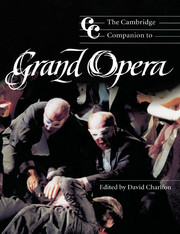Book contents
- Frontmatter
- 1 Introduction
- Part I The resourcing of grand opera
- 2 The ‘machine’ and the state
- 3 Fictions and librettos
- 4 The spectacle of the past in grand opera
- 5 The chorus
- 6 Dance and dancers
- 7 Roles, reputations, shadows: singers at the Opéra, 1828–1849
- Part II Revaluation and the twenty-first century
- Part III Grand operas for Paris
- Part IV Transformations of grand opera
- Notes
- Select bibliography
- Index
5 - The chorus
from Part I - The resourcing of grand opera
Published online by Cambridge University Press: 28 November 2011
- Frontmatter
- 1 Introduction
- Part I The resourcing of grand opera
- 2 The ‘machine’ and the state
- 3 Fictions and librettos
- 4 The spectacle of the past in grand opera
- 5 The chorus
- 6 Dance and dancers
- 7 Roles, reputations, shadows: singers at the Opéra, 1828–1849
- Part II Revaluation and the twenty-first century
- Part III Grand operas for Paris
- Part IV Transformations of grand opera
- Notes
- Select bibliography
- Index
Summary
The chorus puts the ‘grand’ into grand opera. In Act III of Les Troyens, when Berlioz moves the action from Troy to Carthage, he establishes the grandeur of Carthage by joining a supplementary chorus to the regular house chorus, so that there are ‘two or three hundred voices, men, women, and children’ to sing the National Song, ‘Gloire, gloire à Didon’ (Ex. 5.1). Beyond sheer size of chorus, it can be choral complexity that makes grand opera grand, as in the third-act finale of Les Huguenots, when the Catholic newly-weds, Valentine de Saint-Bris and the Comte de Nevers, are joined by dancing gypsies and a five-part mixed chorus of wedding guests as they make their way from the bank of the Seine on to a festive wedding boat, where a band is playing for them. These festive sounds make themselves heard against the very different sounds of the ongoing sectarian dispute emanating from the shore: the solo voices of the Catholic queen and of Valentine's disappointed Huguenot suitor Raoul and the choral voices of seigneurs of both faiths, as well as Catholic students (a two-part chorus of tenors) and Huguenot soldiers (a two-part chorus of basses) (Ex. 5.2).
These two numbers push the resources even of grand opera to their limits. Berlioz was dreaming, and he knew it: in the score of Les Troyens (a work he composed with no promise of performance) he allowed in a footnote that ‘the supplementary chorus is not obligatory’. And even the score of Les Huguenots, which Meyerbeer wrote to order for what he called the (immense resources' of the Paris Opera, shows where a cut was made to the Act III finale in the original Paris production.
- Type
- Chapter
- Information
- The Cambridge Companion to Grand Opera , pp. 76 - 92Publisher: Cambridge University PressPrint publication year: 2003
- 3
- Cited by



